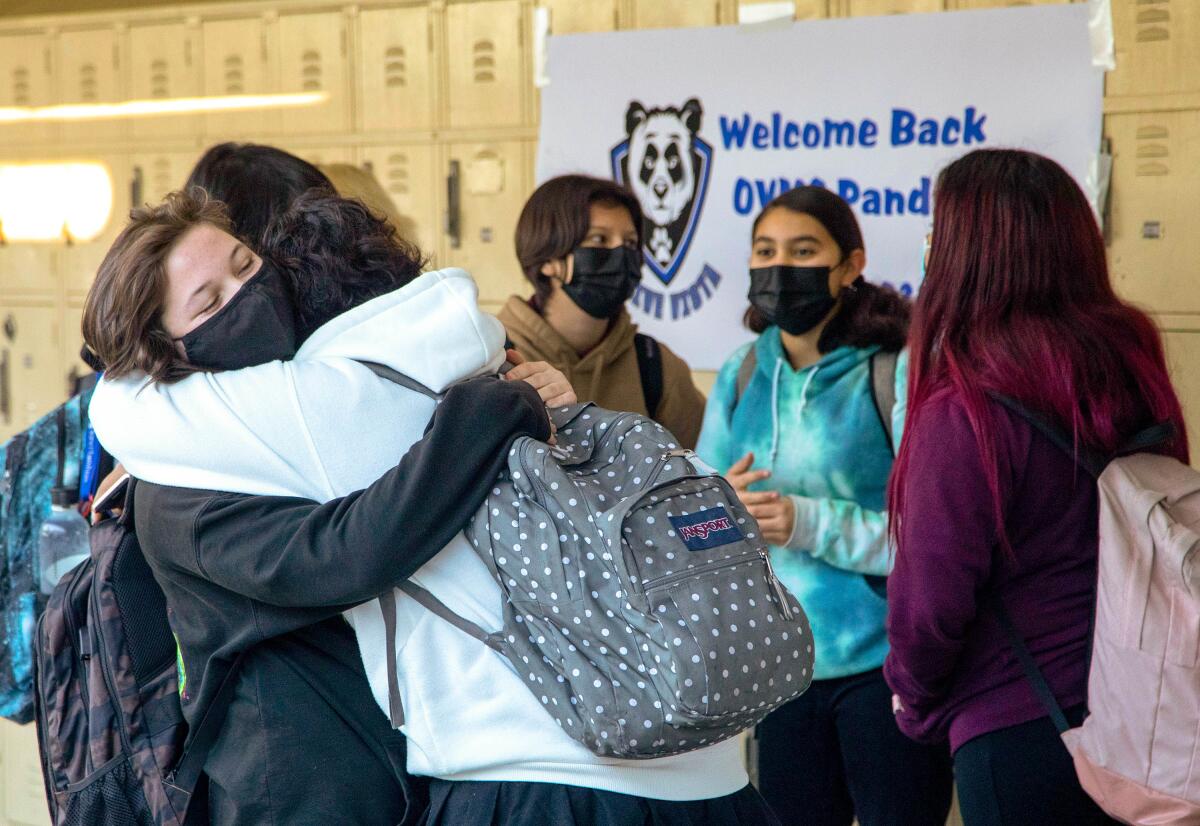Newsletter: Essential California Week in Review: Six million cases and counting

- Share via
Good morning, and welcome to the Essential California newsletter. It is Saturday, Jan. 15.
Sign up for Essential California
The most important California stories and recommendations in your inbox every morning.
You may occasionally receive promotional content from the Los Angeles Times.
Here’s a look at the top stories of the last week
Six million coronavirus cases and counting have been reported in California, according to data compiled by The Times, as the Omicron variant continues its staggering spread. The record-setting pace of infections is putting pressure on hospitals, schools and other institutions.
It’s not a stay-at-home order, but … amid an unprecedented wave of coronavirus infections, Los Angeles County health officials are urging residents to postpone nonessential gatherings and avoid some activities. In Sonoma County, meanwhile, health officials have enacted a 30-day ban on large gatherings.
State tells coronavirus-positive medical workers to stay on the job. Officials are attempting to address California’s hospital staffing shortage through a sweeping policy change that allows asymptomatic healthcare workers to return to work immediately through Feb. 1.
L.A. Unified opens amid high infections. Hundreds of thousands of Los Angeles students returned to campus from winter break Tuesday as schools grappled with staffing shortages, student absences and anxious parents and students, testing the district’s carefully laid plans to open schools.
With a surplus of funding, Gov. Gavin Newsom unveils his budget. After another year of gushing tax revenue, it seems there’s nothing standing in Newsom’s way. But his record will hinge on whether he can make progress on the problems of today and meet the needs of tomorrow.
- Newsom’s $286.4-billion spending plan released Monday focuses on COVID-19, children and climate change.
- The proposal makes a significant pledge to the University of California and California State University, but they must meet specific targets.
- Newsom wants to shift home construction in California away from rural, wildfire-prone areas and toward urban cores, aiming to align the state’s housing strategy with its climate goals.
Broken promise in legalized cannabis. The state was supposed to clear criminal records after voters approved recreational marijuana in 2016. But thousands of people are still stuck with felonies, misdemeanors and other convictions on their records, a Times investigation found.
Blood shortage consequences. Ongoing national blood shortages forced the Los Angeles County Department of Health Services to shut down one of its trauma centers to new patients for hours on Monday. San Diego County’s busiest trauma centers are also reporting critically low supplies.
Robert Durst dies. The real estate scion, 78, died of natural causes at 6:44 a.m. Monday at a hospital near Stockton. He dodged justice for nearly four decades until he was convicted of one murder in September. He remained a suspect in the disappearance of his first wife and another killing.
Garcetti goes to Washington — and maybe India. Los Angeles Mayor Eric Garcetti’s nomination to serve as U.S. ambassador to India was approved Wednesday by the Senate Foreign Relations Committee. His nomination now heads to the full Senate for confirmation.
Sirhan Sirhan parole bid rejected. Newsom on Thursday refused to parole the man convicted of gunning down Robert F. Kennedy in Los Angeles, a brazen assassination of a presidential candidate that scarred the nation and altered the course of American politics in the 1960s.
Enjoying this newsletter?
Your support helps us deliver the news that matters most. Become a Times subscriber.
ICYMI, here are this week’s great reads
COVID made it hard for the Walmart of the seas to stay afloat. Founded in 1932, Harbor Ship Supply is the oldest ship supplier in Southern California and is part supermarket, hardware store and gift shop to ships and seafarers. But acquiring products has become harder and more expensive.
After leaving Black Lives Matter, co-founder Patrisse Cullors is healing. Weeks after Cullors denounced as misleading reports that she had been on a personal “million-dollar real estate buying binge,” she stepped down as director of the movement’s foundation. Six months later, she’s recovering from the experience and says she’s still committed to Black lives. She’s also full of insights regarding what went wrong.
A neglected California city reinvents itself with electric cars — and plots a road map for the nation. Getting low-income communities to transition to costly electric cars is one of the biggest climate challenges faced by the state and nation. But the rural town of Huron, Calif., and the urban community of Rancho San Pedro show it can be done.
Free online games
Get our free daily crossword puzzle, sudoku, word search and arcade games in our game center at latimes.com/games.
Today’s week-in-review newsletter was curated by Laura Blasey. Please let us know what we can do to make this newsletter more useful to you. Send comments, complaints and ideas to essentialcalifornia@latimes.com.
Our daily news podcast
If you’re a fan of this newsletter, you’ll love our daily podcast “The Times,” hosted every weekday by columnist Gustavo Arellano, along with reporters from across our newsroom. Go beyond the headlines. Download and listen on our App, subscribe on Apple Podcasts and follow on Spotify.
Sign up for Essential California
The most important California stories and recommendations in your inbox every morning.
You may occasionally receive promotional content from the Los Angeles Times.






